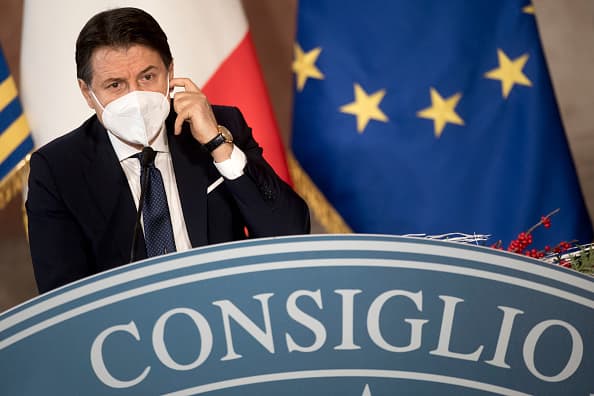Italy’s prime minister answers questions during a press conference at the end of the year.
Alessandra Benedetti – Corbis | Corbis News | Getty Images
Italy is on the verge of another political crisis as members of the coalition government question the prime minister’s plan for the country’s economic recovery.
The southern European country is no stranger to political struggles. Tensions, scandals, and small majorities have led to more than 60 governments since World War II. However, the recent political spat comes at a particularly painful moment, as the number of coronavirus infections and deaths is among the highest so far in Europe and GDP is expected to shrink by about 10% in 2020.
“In the most likely scenario, the crisis will lead to the formation of a new CEO,” said Wolfango Piccoli, co-chair of consulting firm Teneo, in a note on Monday.
Prime Minister Giuseppe Conte has been in power since June 2018, but he is already heading his second government after a political conflict in the summer of 2019 culminating in a new alliance made up of the left-leaning Democratic Party, the Five Star Movement, and the last left-leaning party in the government.
The Gordian knot is how EU money is spent and whether it will be assigned to new or pre-existing projects.
Alberto Alimano
Professor, HEC Business School
The final challenge brings Conte, without political affiliation, against former Prime Minister Matteo Renzi, who defected from the Democratic Party in September and created his own group called Italia Viva, which supports the coalition and has two ministerial posts. However, Renzi is threatening to withdraw his support for the current executive, arguing that Conte’s economic recovery plan is not ambitious enough.
The European Union has agreed to tap into the financial markets in search of 750 billion euros ($ 920 billion), which will be invested in the 27 countries to help them re-emerge their economies after the coronavirus pandemic.
One of the main beneficiaries of these funds is Italy, as it expects grants and low-interest loans of € 208 billion. However, the challenge is how to get the most out of this money given that Italy has the second-highest public debt heap in the European Union and its economy was already struggling before the pandemic.
“The Georgian knot is how the EU’s money is spent and whether it will be assigned to new or pre-existing projects. While the former will increase the standard Italian public debt, the latter will reduce the positive impact of the EU’s financial support,” Alberto Alemanno, a law professor In the European Union at HEC Paris Business School, to CNBC on Tuesday.
Experts like Teneo Piccoli believe that the dispute “will reach its climax later this week when Conte submits his revised economic recovery plan to the Cabinet for approval. The impetus for the official openness of the crisis may be the refusal of Italia Viva’s ministers to endorse the plan.”
“While FIFA Italy is only a junior partner in the ruling coalition, the numbers are very narrow in Parliament, and especially in the Senate, that by withdrawing its support it could lead to a vote of confidence in the prime minister.”
Ignazio Corao, the independent Italian MP in the European Parliament, told CNBC on Tuesday that early elections will likely be avoided and that either there will be a new prime minister or there will be a reshuffle.
Curao said that Renzi “needs to use all the political means that he has now … in order to gain powers in the future,” indicating that political discord could be a tactic for the recently established Italia FIFA party to gain more ground.
Yield on 10 years Italian Bonds rose slightly this week, as the markets opened in the first trading days of 2021 and against the backdrop of the political situation. However, the yield is still trading at low levels around 0.532% due to the massive amount of monetary and fiscal stimulus in Europe.

“Appassionato pioniere della birra. Alcolico inguaribile. Geek del bacon. Drogato generale del web”.

